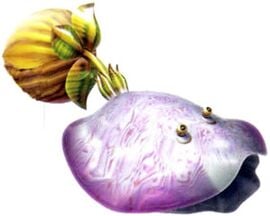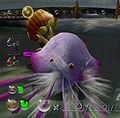Toady Bloyster
| |||
|---|---|---|---|
| Appears in | Pikmin 2, Pikmin 3, Pikmin 4 | ||
| Scientific name | Molluschid minionicus | ||
| Family | Mollusking | ||
| Areas | Perplexing Pool, Garden of Hope, Twilight River, Serene Shores, Hero's Hideaway (Olimar's Shipwreck Tale) | ||
| Caves | None | ||
| Challenge Mode stages | The Giant's Bath | ||
| Mission Mode Collect Treasure! stages | Forgotten Cove, Clockwork Chasm | ||
| Mission Mode Battle Enemies! stages | Silver Lake, Shaded Garden, The Rustyard | ||
| Side Story days | River, Tundra | ||
| Dandori Challenge stages | None | ||
| Dandori Battle stages | None | ||
| 2-Player Battle stages | None | ||
| Bingo Battle stages | Buried Pond | ||
| Attacks | |||
The Toady Bloyster (ツブラメケメクジ?, lit.: "Cute-eyed Kemekuji") is a slug-like enemy found in Pikmin 2, Pikmin 3, and Pikmin 4. Toady Bloysters creep along the ground in search of food, and upon discovering Pikmin, they emit a loud call reminiscent to that of a cow calf (Pikmin 2 only), then lash out their tentacle-like tongue. Any Pikmin hit by the tongue stick, and are ingested if the Bloyster is not killed before it can finish "chewing." As slow as they may be, Bloysters are capable of causing a very large and sudden drop in the number of Pikmin a leader has at their disposal, should the player be careless enough to allow them the chance.
Gill-like organs can be found on their bulbs, acting as weak spots. Although their bodies can be attacked for lesser damage in Pikmin 3 and Pikmin 4, in the previous game, only the bulbs can be attacked (even though it's possible to attack their bodies using Purple Pikmin). When one receives heavy damage, it shakes its tail and throws away any Pikmin hanging on to it in Pikmin 2, but merely ejects ink in Pikmin 3 and Pikmin 4. This ink can temporarily and non-fatally choke any nearby Pikmin, but those hanging on the bulb will not be affected by it. In Pikmin 2, they have seven distinct tentacles, whereas in the sequels, they have one that splits into six, which changes colors from blue to red in each sequel.
In Pikmin 2, a single Toady Bloyster spawns in the Perplexing Pool, and tends to rove around the shallows near the entrance to the Shower Room. When defeated, it typically drops two 10-Pellets in addition to the gill-like organ on its back, which is worth 25 Pikmin at any Onion. Entering any of the caves in the Perplexing Pool will trigger a respawn, making this Bloyster a particularly low-risk method of spawning large amounts of Pikmin in a short amount of time, potentially 45 Pikmin per Bloyster defeated. In Challenge Mode, a Toady Bloyster holds The Key on the first sublevel in The Giant's Bath. In Pikmin 3's Story Mode, one appears in the Garden of Hope, and one in the Twilight River.
Stats
| Game | Weight | Max. carriers |
Seeds | Value | Health | Regen. |
|---|---|---|---|---|---|---|
| 3 | 6 | 25 | 800 | 2.4 HP/s | ||
| 3 | 6 (normally) | 20 | 1500[1] | No | ||
| 3 | 6 | 10 (5 glow pellets) | 1500 | No |
- ^ 500 HP on Shaded Garden (Battle Enemies) and Silver Lake (Battle Enemies).
Notes
Olimar's notes
Louie's notes
Alph's comments
“Structural flaw: tail bulb
Weight: 3
Brittany's comments
Charlie's comments
Louie's comments
Olimar's comments
“Toady Bloyster
Molluschid minionicus
Mollusking family
“Toady Bloyster
Molluschid minionicus
Mollusking family
Dalmo's notes
“Cute little marble-like eyes, a smooth undulating body, a big curvy mouth, a tongue that extends and separates into six parts, gills like fruit from a plant... Sit a moment, and take it all in. Sometimes it's fun to simply appreciate how a creature that can do so much damage can still be such an adorable addition to our universe!”
Pikmin 2 Nintendo Player's Guide
Pikmin Garden
Text
“花のような大きなエラを持つ、水陸両棲の軟体生物。進化の過程で貝殻を失ったケメクジ科の中では、あまり目が飛び出ていない。雌雄同体で、一個体にオスとメスの生殖器官を持っている。
特徴 その1 細長い舌
- 6本に枝分かれした細長い舌で獲物のにおいを感じ取り、一度にたくさん捕食する。
- (Image text: 枝分かれする前は舌先が縮まっている)
特徴 その2 スミを出す
- 外敵に攻撃されて身の危険を感じると、体からスミを噴き出す。
- (Image text: 獲物や外敵の視覚をうばう)”
Translation
“An amphibious mollusk with a large flowerlike gill. The eyes do not protrude as much as in other members of the Mollusking family, which have lost their shells in the course of evolution. It is hermaphroditic, meaning that a single individual has both male and female reproductive organs.
Feature #1: Long, slender tongue
- When it detects the scent of its prey, it uses its six-branched, long, slender tongue to feed on a large number of prey at once.
- (Image text: "The tips of the tongue are contracted before branching")
Feature #2: Squirting ink
- When it is attacked by an enemy and feels threatened, it squirts ink from its body.
- (Image text: "It blinds prey and enemies")”
Strategy
|
The following article or section contains guides. |
Pikmin 2
The best method of taking down a Toady Bloyster is simple: approach it from the back and latch as many Pikmin as possible onto the gill-like organ protruding from its back. If you are feeling bold, you may instead decide to simply barrage the Bloyster in question with Purple Pikmin. Petrifying the Bloyster is a foolish task, as it shares the highest bitter-spray damage resistance in the game with the Ranging Bloyster. Toady Bloysters do not actively seek out Pikmin, but they will not pass up the opportunity to eat Pikmin standing in front of them. While they have slow reaction time, their shake has a deceptively large hitbox, and Pikmin are shaken off when the Bloyster finishes its tongue lash animation. Caution must be taken to not let it attack while on low health, as it will not stop its attack animation when it reaches zero health, and it cannot be petrified when it reaches zero health as well.
Pikmin 3
The Toady Bloyster can be attacked by throwing Pikmin onto its bare, fleshy back instead of the gill-like protrusion on its back. If the Bloyster releases ink, just whistle the affected Pikmin back to you and continue the assault, and if you don't, they will not die and just become idle. Using an ultra-spicy spray proves to be effective as well. Throwing Pikmin at the gill organ, as stated before, will prevent them from being sprayed with ink, allowing just a few Pikmin to kill it in seconds. This is a helpful strategy, especially for Mission Mode.
It can be noted that the Toady Bloyster found in at least Silver Lake and Shaded Garden on Battle enemies! mode are significantly weaker than the average one.
Pikmin 4
Toady Bloysters can be dealt with in much the same way as in Pikmin 3. Simply throw Pikmin on its tail-based gill organ and they won't be affected by the ink that the bloyster sprays out. It can still be defeated through attacking the main body but the tail method is generally considered the fastest and easiest way to beat them, as that way they are completely safe from their ink splash. The Toady Bloyster may be quite slow in terms of movement and eating, but it's tentacle-like tounge can grab many Pikmin at once. As such, it is usually a very bad idea to charge the bloyster from the front.
Technical information
Internally, in Pikmin 2, the Toady Bloyster is just a Ranging Bloyster, but some of the properties provide specific differences such as its size, and the hard-coded ability to be entranced by leaders is removed.
| Pikmin 3 technical information (?) | |
|---|---|
| Internal name | kemekuji
|
| HP | 1500 |
| Rock Pikmin throw hits to kill | 30 |
| White Pikmin ingestions to kill | 5 |
| Bomb rock explosions to kill | 1 |
| Bomb rock ingestions to kill | 1 |
| Number of direct hits on top to kill | 0 |
| Damage to leaders | 10 |
| Territory radius | 300 |
| Mission Mode value | 50 |
Other information
- Size: Body length: 105mm, as per the e-card
- Pikmin 2 Piklopedia number: #42
- Pikmin 4 Piklopedia number: #104
Naming
- See more: Mollusking family#Naming.
- Common name: Toady Bloyster. "Toady" is a noun for someone who acts excessively obedient for someone else, like a minion. It could also reference the Toady Bloyster's toad-like profile, although "toady" is not normally an adjective.
- Japanese nickname: ツブラメケメクジ?, lit.: "Cute-eyed Kemekuji" ケメクジ? is a spin off of the word ナメクジ? which means slug, the character ケ? could refer to hair or fur, but since this creature doesn't have any fur, it may have been picked for its sound rather than for its meaning.
- Japanese name: ハンジュクケメクジ?, lit.: "Half-ripe Kemekuji".
- Scientific name: Molluschid minionicus. Minionicus is similar to the English word "minion".
- Internal names: In Pikmin 2, it uses the internal name
umimushiblind, which is the Ranging Bloyster's internal name, but with "blind" at the end of it, since it does not see the leaders' beacons. For Pikmin 3, the internal name was changed tokemekuji, which is part of its Japanese name. - Prerelease: None.
Names in other languages
| Language | Name | Meaning |
|---|---|---|
| ツブラメケメクジ? Tsubura Me Kemekuji |
Cute-eyed Kemekuji | |
(traditional) |
圓眼蛞蝓 | Round-eyed Slug |
| Platslak | Flat Snail | |
| Jeune éventraille | Portmanteau of "éventrer" (disembowel) or "entrailles" (innards) and "éventail" (fan), and "jeune" (young) | |
| Krötenknaller (Pikmin 2) Camoflunder (Pikmin 3, Pikmin 4) |
Toad Cracker Portmanteau of "Flunder" (flounder) and camouflage | |
| Blostrica semplice | Simple bloyster | |
| 동글눈맨들민달팽이 | ||
| Marisduá | Portmanteau of marisco (shellfish) and tamanduá (anteater) | |
| Berberéchido soplón | Snitch cockle |
Gallery
Pikmin 2
Multiple Toady Bloysters as seen in the Piklopedia.
The Piklopedia icon of the Toady Bloyster in the Nintendo Switch version of Pikmin 2.
Pikmin 3
Pikmin 4
The Toady Bloyster's Piklopedia icon.
A Toady Bloyster spraying ink on a squad of Blue Pikmin.
A Toady Bloyster in Hero's Hideaway; Olimar's Shipwreck Tale.
Other
The Toady Bloyster's e-card, #26.
Trivia
- Toady Bloysters are based on nudibranchs, which are sea slugs that are very similar in appearance. Like nudibranchs, Toady Bloysters evolved from a shelled ancestor species to a soft-bodied state.
- In Pikmin 2, Toady Bloysters are one of three enemies not to appear in the Wistful Wild, the others being the Giant Breadbug and the Waterwraith. Curiously, all three reside in the Perplexing Pool.
- In Pikmin 3, leaders can climb on top of Toady Bloysters by walking onto them from their backs.
- In both Pikmin 2 and Pikmin 3, when a Toady Bloyster dies, its main body shrinks while the bulb stays the same size. Even though the body becomes very small, it's still possible to see in-game, using the closest zoom settings or the KopPad's camera. The same happens with the Ranging Bloyster, Burrowing Snagret (only in Pikmin 2), and Pileated Snagret.
The Toady Bloyster's tiny body, visible in Pikmin 2. It's below the slash in the Pikmin counter. Click the image for a larger size.
The same thing, but in Pikmin 3. Here, it's below the central rectangle of the KopPad's camera. Click the image for a larger size.



















